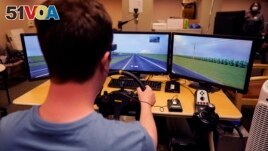29 August 2022
Researchers at the University of Michigan are studying the ability of people with autism spectrum disorder to notice road hazards. The scientists plan to use their findings to help young automobile drivers improve their driving skills.
The effort will be the second part of a project supported by Ford Motor Co. The project includes the university in Ann Arbor as well as a local driving school.
The first part of the study included tests with driving simulation programs. The researchers found that students with autism spectrum disorder detected fewer hazards than those without the disorder.

Tate Ellwood-Mielewski test drives on a simulator as part of a study at the University of Michigan, Friday, April 29, 2022, in Ann Arbor, Michigan. (AP Photo/Carlos Osorio)
But lead researcher Elise Hodges said that some extra work behind the wheel helped the students drive more safely.
"Those folks that underwent training improved in two-thirds of hazards in the simulated drive," said Hodges. She is a clinical associate professor in the University of Michigan's neuropsychology program.
Tate Ellwood-Mielewski is among those who plan to return for part two of the study. He is 23 years old and from Ann Arbor. He was identified as having autism spectrum disorder when he was three years old.
"I do want to be able to drive ... and get places where I want to go," Ellwood-Mielewski said. His mother, Debbie Mielewski, helped bring together the partners to make the study happen.
Mielewski had been growing more concerned about her son's future with no driver's license. She worried especially about what that would mean after she and his father die.
So, Mielewski, a sustainability expert at Ford, spoke with her boss in 2018. She asked her boss, "Would you support a program to help autistic spectrum kids to learn how to drive?"
"And he immediately said, ‘Yes!'" Mielewski said.
Ann Arbor Academy, a school for students with learning and social differences, hosted driving lessons. Hodges designed the simulated drives and oversaw the study. Ford financed the research.
The goal, in part, was to provide a chance for those with autism spectrum disorder to improve their driving skills.
"Many of them ... would like to drive, but getting from wanting to drive and being able to drive are two different things," Hodges said.
The first part of the study found that, in addition to lower hazard detection, students with autism were more likely to slow down and "stop short" in front of stop signs.
Hodges said she hopes the individualized driving sessions planned for the second part of the research will be successful.
Either way, programs like this can go a long way toward helping those with autism overcome their doubts, Debbie Mielewski said.
"If we can just free them to think that they can do anything, I really think they can," she said. "They need support. We should support them."
Hodges said she hopes similar programs appear elsewhere.
"I would hope that parents would learn that their teens or young adults who have ASD actually may be able to drive successfully," she said. "And there may be some tools out there that they may not have been aware of."
Hodges said the second part of the study is expected to start in a month or two.
I'm Caty Weaver.
The Associated Press reported this story. Caty Weaver adapted it for VOA Learning English.
_________________________________________________________________
Words in This Story
detect –v. to discover or determine the existence, presence, or fact of
hazard –n. a source of danger
simulation –n. the imitative representation of the functioning of one system or process by means of the functioning of another
doubt –n. disbelief; a lack of trust in something
aware –v. to have knowledge of something